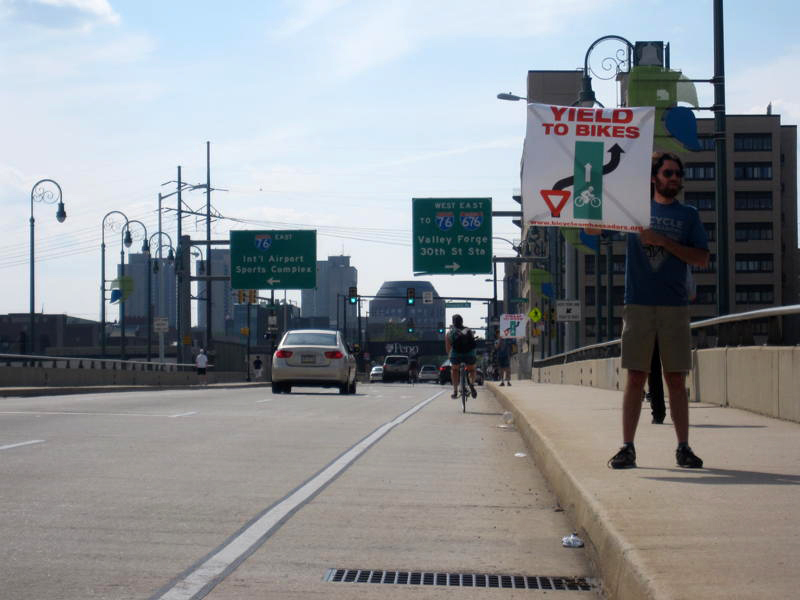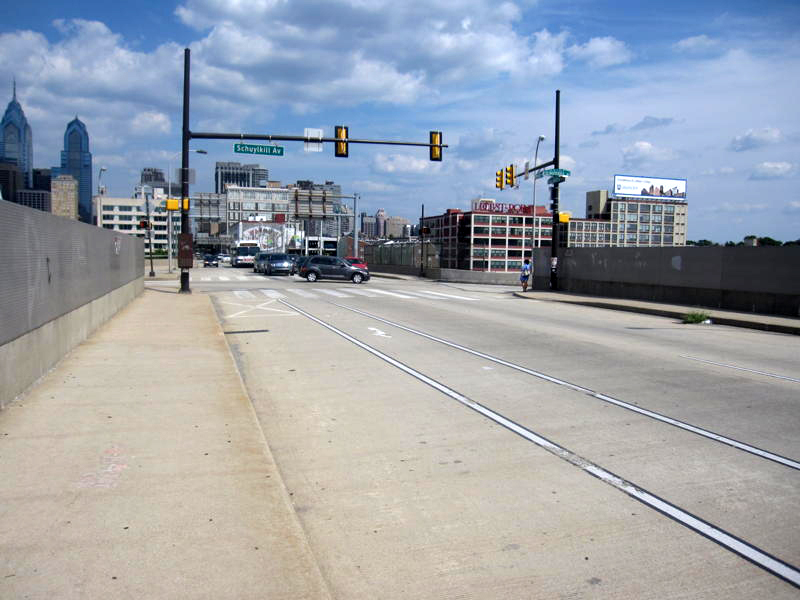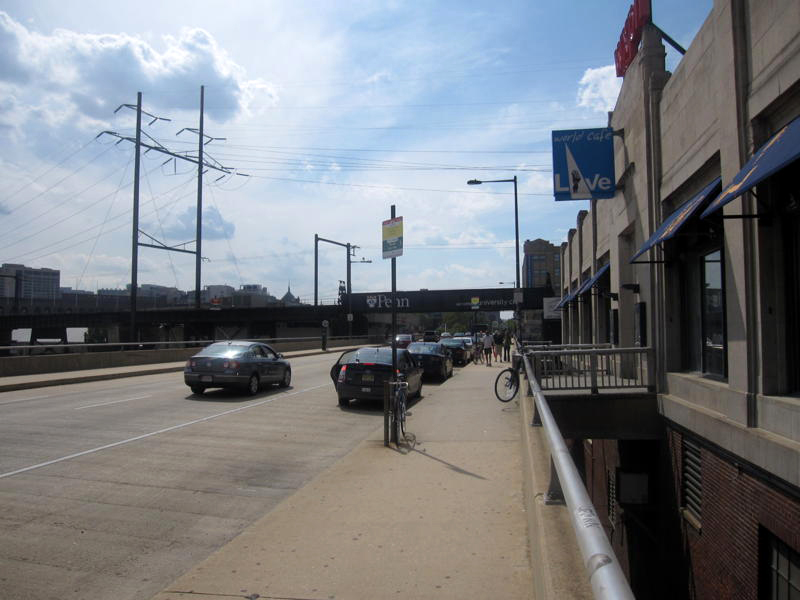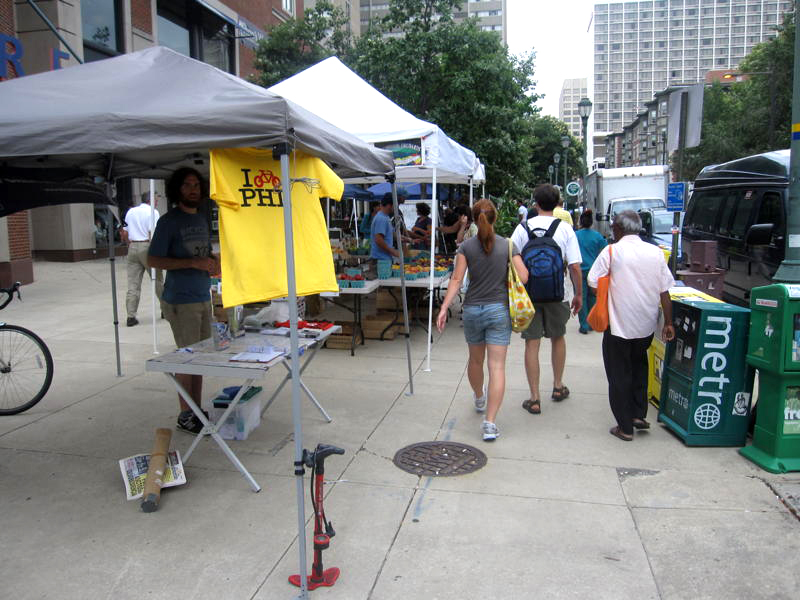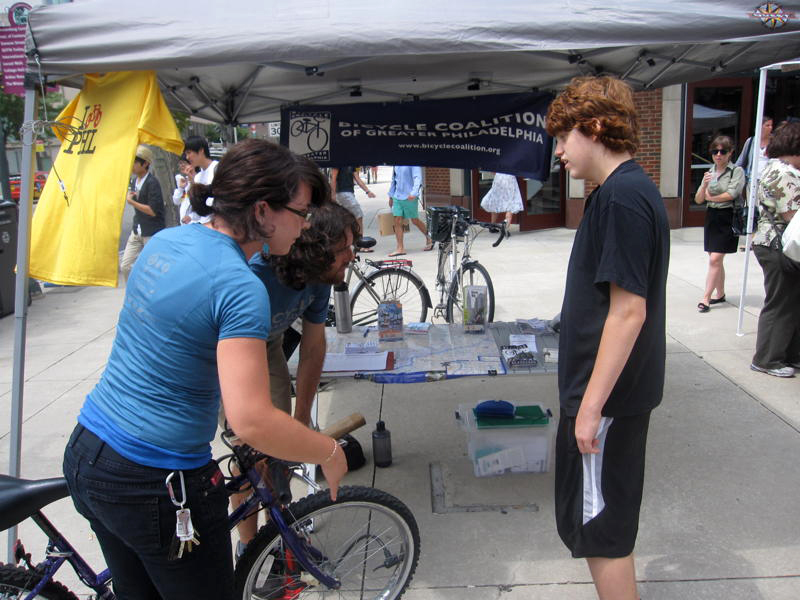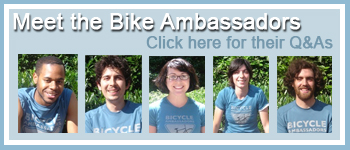Grassroots group teaches bicycling rights and responsibilities
It’s a common sight. College-aged solicitors in uniform stand on Philadelphia’s street corners, greeting passersby, cajoling for charity with tugs on heart strings.
But this summer, the Bicycle Coalition of Greater Philadelphia’s Bike Ambassadors are not strolling sidewalks for donations. They just want to keep you safe — and maybe get you on two wheels.
They want to make biking better in the country’s most active bicycle commuter city.
Working in Center City, University City and Fairmount Park, Ambassadors teach safety and etiquette and provide commuter tips, interacting with folks at community events and at official Bicycle Coalition functions. The group teaches riders how to properly fit a helmet, inspect their bicycles, ride with traffic, avoid pedestrian-crowded sidewalks and more.
As equally important is educating motorists about the rules of the road — like sharing it.
On a late July day, Hannah Lee, Julian Root and Jonathan Farbowitz stood on the sidewalk of the Walnut Street Bridge, a westbound vehicular bridge with two lanes of traffic adjacent to a bike lane, Center City’s bicycle artery to West Philadelphia.
As cars zoomed across, the three Ambassadors held signs urging cars to yield to the many passing bicyclists. Riders cheered and high-fived Ambassadors on the road. Pedestrians stopped to chat. A few cars tooted support, while some detractors honked disapproval.
The group is campaigning heavily this year around yielding laws, and has been stationed on the bridge — on which an active Schuylkill Expressway on ramp lane merges with the bridge’s bike lane — twice per week since June. Yielding has been a priority for the program since May, when a father and child on a tandem bicycle were struck by a car — and the boy taken to Children’s Hospital in critical condition — near the Philadelphia Museum of Art.
“Cars aren’t yielding at the right-turn lane, at what we call the blue line of death—the bike path,” said Lee. “It’s very scary.”
It’s a life and death matter taken seriously by the Ambassadors, a group of twenty-somethings chosen through a competitive interview process. Team members each work 35 to 40 hours per week, starting as early as sunrise and staying some days late into the night. Every hour is spent on their feet — or on a bike.
It’s hard work for a deserved cause, program organizers say.
“Cycling in Philadelphia has grown tremendously over the past few years and we want to see that continue to grow,” the Coalition’s Education Director Breen Goodwin said. “But we also want people to know about their rights and responsibilities on the road.”
According to a 2008 survey, the Census Bureau reported that Philadelphia has the most bicycles per capita of the ten largest cities.
The Ambassadors program launched last May, but its invention was in the works for some time, Goodwin said. “It took a lot of years to find funding for it. It was a long, drawn out process, modeled after a program in Chicago,” she said. “We really started this program as a grassroots community outreach program.”
THE BASICS BLUES
Grassroots? Maybe guerrilla is a better word for it.
Infiltrating businesses, the Bike Coalition’s five ambassadors lead a popular urban biking basics class during company lunch breaks. They set up stations on bike trails in Fairmount Park, offering tire air, chain lube to lure passing cyclists with promise of free maintenance. They attend farmer’s markets, community festivals and other events. They hit the streets.
Last year, the Ambassadors reached over 20,000 people — that is, having an exchange with someone for 10 or more minutes — according to internal data.
It’s not been an easy climb. “Once people figure out we’re not asking them for money and we’re just talking to them, they’re in for a conversation. But the hard part is developing that trust that I’m not going to take advantage of you — that I’m only going to take up a small part of your time,” Goodwin said.
In late June, PlanPhilly joined the Ambassadors for an evening urban riding basics class in a South Philadelphia branch of the Free Library.
As Ambassadors Cecilia Marraro and Brian Davis waited for walk-in students, they explained a normal class experience. Normally, they illustrate the differences between riding as children — when many folks first lose their training wheels — and riding as adults. They explain benefits of commuting by bike. They teach rudimentary safety and basics of biycle laws. They give tips for choosing bike-friendly roads and discuss the hazards that come with ones that are not.
Davis said the most positive outcome of the class is that “people learn about biking as a legal vehicle, not just as something to play with.”
Though the classes sometimes bring as many as twelve people, on this particular evening, no one showed. By bike or otherwise.
“The classes themselves are great. It’s getting people to the classes that’s tough,” Davis said.
Slim attendance from beginner bikers or not, some say their attendance is not nearly as important as the education and enforcement of motorists.
Mike McGettigan, owner of Trophy Bikes — a retail and repair shop on the West side of the Walnut Street Bridge — said it’s a chicken and egg issue.
The Ambassadors actively educate about sidewalk biking issues (it is illegal in the city), but in order to crack down on sidewalk riding, McGettigan says police must enforce speeding, reckless driving and cell phone use in cars.
“I’m not against [the Ambassador program] but I don’t know if it’s that effective. I’d rather see more people get points on their license. Friendly ambassadors or harsh ticketing won’t put me in the street if I think I’m gonna die there,” he said.
SUCCESS COMES IN CYCLES
In September, the Ambassadors will be relieved of their duty. Goodwin says that the Bicycle Coalition is in the process of cultivating volunteers to take over some of the responsibility through the winter. And to help keep the goodwill alive.
“I know this program has got people out on the streets. I know it’s changed people’s behavior. Has it changed all twenty thousand? No, but its given people something to think about,” she said.
Goodwin hopes the program can expand city-wide, bringing education efforts to neighborhoods. But it will need to grow organically, she says. And every sprout helps. Ambassadors sell t-shirts for $15 and membership to the Coalition starts at $35. As a member-supported organization, donations are a foundation.
“What’s really been amazing is seeing the impression we’re leaving on people,” Goodwin said. “We’re out in the community becoming a trusted source. I think that’s a pretty big success in a short amount of time.”
Outside Penn Farmer’s Market in West Philadelphia in late July — where the Ambassadors set up shop four times per week — Ambassador Julian Root tallied a smaller success: helping a bicyclist fix a potentially dangerous wheel issue. It’s one more example of how the group connects to the biking community.
“What’s really great is that sometimes someone says, ‘I talked to you guys about riding, and it’s not as hard as I thought it would be,'” Root says.
“That’s kind of our bread and butter — when people tell us about an actual change we’ve made in their lives.”
Gallagher is the co-Founder and President of The Haverford School Cycling Team and the editor-in-chief of his school newspaper. Last year, he and a classmate at Haverford designed an energy-producing stationary bicycle that won multiple awards in the international science competion The Pete Conrad Awards. Billy Gallagher will attend Stanford University in the fall. Contact Billy at wmg2010@yahoo.com
WHYY is your source for fact-based, in-depth journalism and information. As a nonprofit organization, we rely on financial support from readers like you. Please give today.



